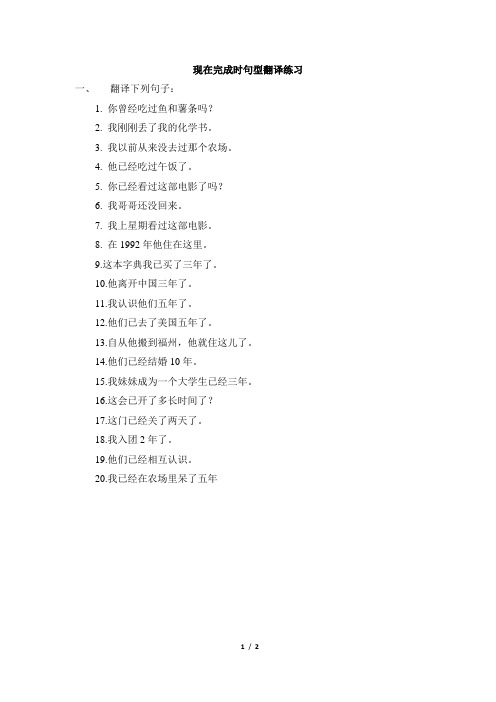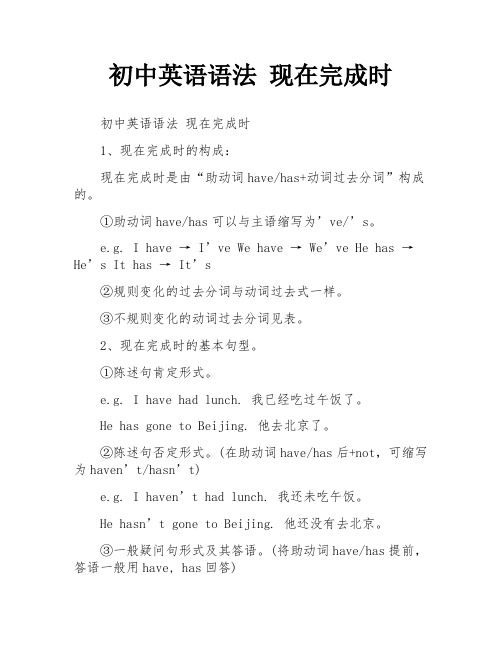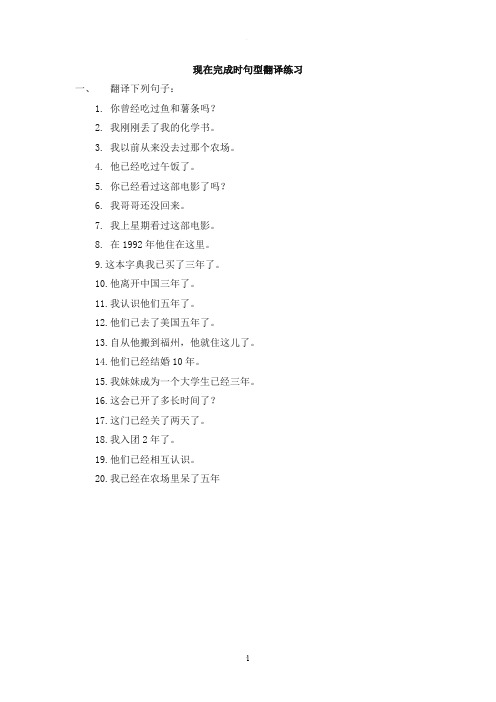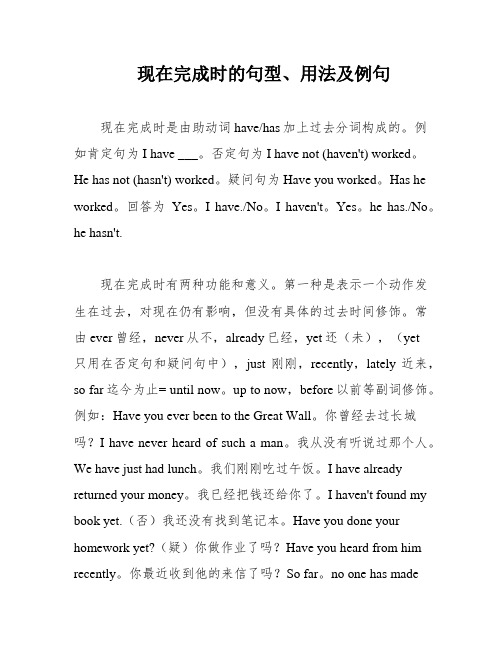实例句型.现在完成时
现在完成时常用句型

现在完成时常用句型1. “I have already eaten breakfast.” 早上我起来后,妈妈问我:“宝贝,吃早餐了吗?”我拍拍肚子说:“I have already eaten breakfast.”2. “You have juste back from school.” 我一进家门,爸爸就说:“You have juste back from school.”3. “We have played this game before.” 小伙伴们来找我玩游戏,其中一个说:“我们玩这个游戏吧。
”我回答:“We have played this game before.”4. “He has already done his homework.” 我去找小明玩,他妈妈说:“他在房间呢,He has already done his homework.”5. “She has watched this movie many times.” 我们讨论电影的时候,小红说:“这部电影超好看。
”我回应:“She has watched this movie many times.”6. “They have gone to the park.” 我问弟弟妹妹们去哪了,妈妈说:“They have gone to the park.”7. “I have known him for a long time.” 朋友好奇地问我和那个人认识多久了,我笑着说:“I have known him for a long time.”8. “You have read this book, haven't you?” 我拿着书问同桌:“You have read this book, haven't you?”9. “We have visited that place before.” 一家人商量去哪里玩,我突然想起说:“We have visited that place before.”10. “He has made a lot of mistakes.” 老师看着小明的作业说:“He has made a lot of mistakes.”。
(完整)现在完成时语法

(完整)现在完成时语法现在完成时的基本句型:肯定式:主语 + 助动词have/has + 动词的过去分词.疑问式:助动词Have/Has + 主语 + 动词的过去分词?否定式:主语 + 助动词have/has + not + 动词的过去分词。
例句:1. I have cleaned my room。
我已打扫了房间。
2. He hasn’t finished his homework。
他还没完成作业。
3。
Have you read this novel ? 你看过这本小说吗?Yes , I have. 是的,看过了。
No, I haven’t. 不,没看过。
4. We have studied English for two years。
我们已经学了两年英语了.5. They haven’t seen each other since 1998.自从1998年他们就没再见过面.现在完成时的主要用法1.表示过去发生的某一动作对现在造成的影响或结果。
-— It's so dark。
-—Someone has turned off the light.(有人刚把灯关了,对现在造成的结果是:现在很黑)-— Are you free?-—I have finished my homework. I am free(我已经完成了家庭作业,对现在造成的结果是很有空)2.表示过去已经开始, 持续到现在的动作或状态,可以和表示从过去某一时刻延续到现在的一段时间的状语连用。
表示持续动作或状态的词应是延续性动词.常与since + 过去的时间点,since+谓语是一般过去时的从句;for + 一段时间,so far 等时间状语连用。
如:I have learnt English for more than ten years.我已经学了10多年的英语。
(从10年前开始,持续到现在还在学)She has swum since half an hour ago。
现在完成时句型翻译练习

现在完成时句型翻译练习一、翻译下列句子:1. 你曾经吃过鱼和薯条吗?2. 我刚刚丢了我的化学书。
3. 我以前从来没去过那个农场。
4. 他已经吃过午饭了。
5. 你已经看过这部电影了吗?6. 我哥哥还没回来。
7. 我上星期看过这部电影。
8. 在1992年他住在这里。
9.这本字典我已买了三年了。
10.他离开中国三年了。
11.我认识他们五年了。
12.他们已去了美国五年了。
13.自从他搬到福州,他就住这儿了。
14.他们已经结婚10年。
15.我妹妹成为一个大学生已经三年。
16.这会已开了多长时间了?17.这门已经关了两天了。
18.我入团2年了。
19.他们已经相互认识。
20.我已经在农场里呆了五年参考答案:1.Have you eaten fish and French fries?2.I have lost my chemistry book.3 I have never been to that farm.4. He already had lunch.5 Have you seen this movie yet?6 My brother has not returned.7 I have seen this movie last week.8 He has lived here since 1992.9 I have had this dictionary for three years.10He has left China for three years.11 They have known each other for five years.12 They have been in the USA for five years.13 He has lived here since he moved Fuzhou.14 They have married for ten years.15 My sister has been a university student for three years.16 How long has the meeting kept?17 The door has closed for two days.18I have joined in the Communist Youth League for two years.19 They have known each other since 1999.20 I have been in the farm for five years.。
初中英语语法 现在完成时

初中英语语法现在完成时初中英语语法现在完成时1、现在完成时的构成:现在完成时是由“助动词have/has+动词过去分词”构成的。
①助动词have/has可以与主语缩写为’ve/’s。
e.g. I have → I’ve We have → We’ve He has → He’s It has → It’s②规则变化的过去分词与动词过去式一样。
③不规则变化的动词过去分词见表。
2、现在完成时的基本句型。
①陈述句肯定形式。
e.g. I have had lunch. 我已经吃过午饭了。
He has gone to Beijing. 他去北京了。
②陈述句否定形式。
(在助动词have/has后+not,可缩写为haven’t/hasn’t)e.g. I haven’t had lunch. 我还未吃午饭。
He hasn’t gone to Beijing. 他还没有去北京。
③一般疑问句形式及其答语。
(将助动词have/has提前,答语一般用have, has回答)e.g. Have you had lunch? 你吃过午饭了没? Yes, I have. No, I haven’t.Has he gone to Beijing? 他去过北京了没有? Yes, he has. No, he hasn’t.否定回答还可以用:No, not yet. / No, never. / No, not even once等。
④特殊疑问句形式。
(疑问词+一般疑问句)e.g. Where has he gone? 他去了哪里?3、现在完成时的三个基本用法。
(1) 现在完成时的第一个基本用法表示过去发生或已完成的某一个动作对现在造成的影响或结果。
e.g. Have you had lunch? Yes, I have. I’ve just had it. 你吃过午饭没?有,吃过了,我刚刚吃的。
(影响及结果:我现在饱了,不需要了)He has gone to Beijing. 他已经去北京了。
现在完成时句型翻译练习

现在完成时句型翻译练习一、翻译下列句子:1. 你曾经吃过鱼和薯条吗?2. 我刚刚丢了我的化学书。
3. 我以前从来没去过那个农场。
4. 他已经吃过午饭了。
5. 你已经看过这部电影了吗?6. 我哥哥还没回来。
7. 我上星期看过这部电影。
8. 在1992年他住在这里。
9.这本字典我已买了三年了。
10.他离开中国三年了。
11.我认识他们五年了。
12.他们已去了美国五年了。
13.自从他搬到福州,他就住这儿了。
14.他们已经结婚10年。
15.我妹妹成为一个大学生已经三年。
16.这会已开了多长时间了?17.这门已经关了两天了。
18.我入团2年了。
19.他们已经相互认识。
20.我已经在农场里呆了五年参考答案:1.Have you eaten fish and French fries?2.I have lost my chemistry book.3 I have never been to that farm.4. He already had lunch.5 Have you seen this movie yet?6 My brother has not returned.7 I have seen this movie last week.8 He has lived here since 1992.9 I have had this dictionary for three years.10He has left China for three years.11 They have known each other for five years.12 They have been in the USA for five years.13 He has lived here since he moved Fuzhou.14 They have married for ten years.15 My sister has been a university student for three years.16 How long has the meeting kept?17 The door has closed for two days.18I have joined in the Communist Youth League for two years.19 They have known each other since 1999.20 I have been in the farm for five years.欢迎您的下载,资料仅供参考!致力为企业和个人提供合同协议,策划案计划书,学习资料等等打造全网一站式需求。
现在完成时的用法英语语法大全

现在完成时的用法一)现在完成时的用法之一:表示过去发生或已经完成的某一动作对现在造成的影响或结果。
此时,常与时间副词already(已经),yet(还、已经),just(刚刚、仅仅) ,ever(曾经),never(从不),before(以前)等连用。
这几个副词的用法如下:1.already意为“已经”,通常用于肯定句中,可放在助动词之后,过去分词之前,也可以放在句末。
实例:1)I've already read this book. 我已经读过这本书了。
(“读”这一动作发生在过去,对现在造成的影响是“知道书中的内容”。
)2)I've washed my clothes already.我已经洗了衣服。
(洗衣服的动作已完成,其结果是“衣服冼干净了”。
)注意:在表示吃惊或明知故问等感情色彩时,already也可用于(口语)疑问句中。
实例:3)Have you met him already ?你(真的)已经见过他了?2.yet用在疑问句中意为“已经”,用在否定句中意为“还”,常放在句末。
实例:1)—Has he found his watch yet ?他已经找到他的手表了吗?—No,not yet.不,还没有。
2)The woman hasn't found her dog yet .那位妇女还没有找到她的狗。
(没找到狗,心里着急,这就是对现在的影响)3.just意为“刚刚”,表示行为刚刚过去,常放在助动词与过去分词之间。
实例:He has just come back from school .他刚从学校回来。
4.ever意为“曾经”,用于疑问句或否定句中,放在助动词与过去分词之间。
实例:1)Have you ever been to Hong Kong ?你曾去过香港吗?2)I haven't ever spoken to her.我未曾和她说过话。
5.never意为“从来没有”常与before连用(before要放在句尾,而never多放在助动词与过去分词之间。
现在完成时的句型、用法及例句

现在完成时的句型、用法及例句现在完成时是由助动词have/has加上过去分词构成的。
例如肯定句为I have ___。
否定句为I have not (haven't) worked。
He has not (hasn't) worked。
疑问句为Have you worked。
Has he worked。
回答为Yes。
I have./No。
I haven't。
Yes。
he has./No。
he hasn't.现在完成时有两种功能和意义。
第一种是表示一个动作发生在过去,对现在仍有影响,但没有具体的过去时间修饰。
常由ever曾经,never从不,already已经,yet还(未),(yet只用在否定句和疑问句中),just刚刚,recently,lately近来,so far迄今为止= until now。
up to now,before以前等副词修饰。
例如:Have you ever been to the Great Wall。
你曾经去过长城吗?I have never heard of such a man。
我从没有听说过那个人。
We have just had lunch。
我们刚刚吃过午饭。
I have already returned your money。
我已经把钱还给你了。
I haven't found my book yet.(否)我还没有找到笔记本。
Have you done your homework yet?(疑)你做作业了吗?Have you heard from him recently。
你最近收到他的来信了吗?So far。
no one has madeany mistakes yet。
迄今为止还没有人犯错误。
I have ___。
我以前从来没有乘飞机旅行过。
第二种功能是表示一个动作发生在过去,一直持续到现在刚刚结束或者仍在继续。
常常与for +一段时间,since +过去的一个时间点,since +一段时间+ ago等时间状语连用。
初三英语现在完成时

9. I haven’t read (not read) the book before.
10. He has
just done (do) it.
11. My sister walked (walk) to school every day last year.
12. We will have (have) an exam again sometime next week.
3经验 表示过去到现在之间曾经历过的事情。常和often, never, ever, once, twice, three times, before, since 等连用。 He has never been ill in his life. I have been to the Summer Palace twice. We have visited your school before.
open-be open/ close- be closed/ die-be dead/ join-be in;
be a member of / begin- be on / come to ; go to-be in; at/ 等。
3 have /has been to 与 have/has gone to have/has been to 去过某地 have/has gone to 去了某地 have/has been in 在某地 She has been to Shanghai twice.
2点动词 点动词也叫终止性动词,不能延续。因此这种动词不能与表示 延续的时间状语连用。
He has been dead for 4 years.
He has been dead since 4 years ago.
- 1、下载文档前请自行甄别文档内容的完整性,平台不提供额外的编辑、内容补充、找答案等附加服务。
- 2、"仅部分预览"的文档,不可在线预览部分如存在完整性等问题,可反馈申请退款(可完整预览的文档不适用该条件!)。
- 3、如文档侵犯您的权益,请联系客服反馈,我们会尽快为您处理(人工客服工作时间:9:00-18:30)。
现在完成时
一.构成
助动词have/has + 过去分词
例:肯定句I have worked. He has worked.
否定句I have not (haven't ) worked. He has not (hasn't )worked .
疑问句Have you worked ? Has he worked ?
回答Yes,I have. / No , I haven't . Yes, he has./ No, he hasn't.
二.功能及意义
1.表示一个动作发生在过去,对现在仍有影响,但没有具体的过去时间修饰。
常由下列副词修饰:ever曾经,never从不,already已经,yet还(未),(yet 只用在否定句和疑问句中),just刚刚,recently,lately近来,so far 迄今为止= until now, up to now,before 以前
例:Have you ever been to the Great Wall? 你曾经去过长城吗?
I have never heard of such a man.我从没有听说过那个人。
We have just had lunch 我们刚刚吃过午饭
I have already returned your money.我已经把钱还给你了。
I haven't found my book yet. (否)我还没有找到笔记本
Have you done your homework yet?(疑)你做作业了吗?
Have you heard from him recently ? 你最近收到他的来信了吗?
So far, no one has made any mistakes yet.迄今为止还没有人犯错误
I have never traveled by plane before .我以前从来没有乘飞机旅行过
2 表示一个动作发生在过去,一直持续到现在刚刚结束或者仍在继续。
常常与下列时间状语连用:
→for + 一段时间
I have learned English for 8 years---我已经学习英语八年了
→since + 过去的一个时间点
I have learned English since 2001---我从2001年开始学英语
→since + 一段时间+ ago
I have learned English since 8 years ago---我从八年前开始学英语
→since + 时态为一般过去时的时间状语从句
I have learned English since I was 5 years old---我从五岁开始学英语
→ in the past/last +时间段
We have had two English exams in the past two months在过去的两个月里我们进行了2次英语考试
Great changes have taken place in my hometown in the past ten years 近十年来我的
家乡发生了巨大的变化。
三延续性动词与短暂性动词的用法
①现在完成时中,与一段时间连用时应注意句中的谓语动词须是延续性动词,非延续性动词不可和一段时间连用。
我离开这所学校已经八年了。
误:I have left this school for eight years(×)
他借用我的词典已经两天了
误:He has borrowed my dictionary for two days(×)
②非延续动词与一段时间连用时,可做相应转化
因此①中例句正确形式分别为
我离开这所学校已经八年了。
正:I have been away from this school for eight years(√)
他借用我的词典已经两天了
正:He has kept my dictionary for two days(√)
其它非延续性动词与时间段连用时的变形
buy→have borrow→ keep,
fall asleep →be asleep leave →be away
begin →be on die →be dead,
join→ be in或be a member of return→ be back
come/arrive→ be in get up →be up,
marry →be married catch a cold→ have a cold
③在否定句中短暂性动词可与短时间连用
I haven't gone to see him for several months(我已经好几个月没有去看他了)
I haven't bought anything for two months
四区分
① have been to +地点; 表示去过某个地方(已经回来),常与ever, never ,几次,等连用
②have gone to +地点: 表示到地方去了(还没回来)
③have been in+地点:表示到了某个地方(多久了),常与for + 段时间连用
比较:He has been to China twice(曾经去过,现在不在中国)
He has gone to China 他到中国去了.(他可能已在去中国的路上,或已到中国,总之,现在不在这里)
He has been in China for two years(他到中国已经两年了)
五对完成时的提问用how long.....? 不能用when... ?
六现在完成时常用句型
1 It is the first/second time....that....结构中的从句部分,用现在完成时
It is the first time that I have visited the city
这是我第一次参观这座城市
It is the third time that the boy has been late
这是这个男生第三次迟到了
2 This is the... that.. 结构,that 从句要用现在完成时
This is the best film that I 've (ever) seen
这是我看过的最好的电影
This is the first time that I've heard him sing
这是我第一次听他唱歌
3 It is / It has been + 时间段+ since ...
It has been/ It's 5 years since we last met.
自从上一次我们相遇到现在已经是五年了
It's / It has been 3 months since the man died 那人死去3个月了
4 一段时间+ 完成时结构+ since 引导的时间状语从句
Two years has passed since I came here.
七现在完成时和一般过去时的区别
现在完成时表示过去发生的某一动作对现在造成的影响或结果,强调的是现在的情况,所以它不能和表示过去的时间状语连用,如yesterday, last night, three weeks ago, in 1998 等。
而一般过去时只表示过去的动作或状态,和现在不发生联系,它可以和表示过去的时间状语连用
I have seen the film 我看过这部电影(我了解这部电影的内容)
I saw the film last week 我上周看了这部电影(只说明shangxingqi。
